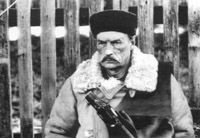Wri./Dir. by Petr Lutsik
DOP Nikolai Ivasiv
Screened at the 46th Sydney Film Festival
Won the International Film Critics prize at the Chicago Film Festival
 This film is a blank space, a two-hour Jarmuschesque non-sequiter. Sitting in the State Theatre
at ten in the morning, trying to lift my spirits against the films I would have to auto-critiquing, I
felt just like one of those Russian peasants armed with a rusty shotgun and three overcoats.
Expect for the snow and the possibility of death. Miles to go before I sleep. Before the film
began the director was introduced to the medium sized audience, and he offered a few words. A
couple that stick in my mind are: "I wouldn't be here this early in the morning. I would never
see a film this early." The crowd laughed and put a small deposit down on weeping later in the
safety of the State's shadows. I merely saluted. The film kicked off, and the theatre instantly
resembled the desolate steppes of Russia. Three tiered class division and all.
This film is a blank space, a two-hour Jarmuschesque non-sequiter. Sitting in the State Theatre
at ten in the morning, trying to lift my spirits against the films I would have to auto-critiquing, I
felt just like one of those Russian peasants armed with a rusty shotgun and three overcoats.
Expect for the snow and the possibility of death. Miles to go before I sleep. Before the film
began the director was introduced to the medium sized audience, and he offered a few words. A
couple that stick in my mind are: "I wouldn't be here this early in the morning. I would never
see a film this early." The crowd laughed and put a small deposit down on weeping later in the
safety of the State's shadows. I merely saluted. The film kicked off, and the theatre instantly
resembled the desolate steppes of Russia. Three tiered class division and all.
The film laconically chronicles the odyssey of three peasants who, after being terrorised by the big-city oil barons, take their complaints to town. Along the way they kill a few people and enlist someone who survives their pummeling. The peasants are a brutish bunch, one in particular displaying a temperament readily disposed to violence. All the violence in the film occurs off screen, and often we are unsure of the victims fate. We hear screams, and we see the bloodied shirt of the brutaliser, but rarely is the body laid out for mourning or burial. The violence is half-seen, not spoken of, even forgotten. This is not a Russian Tarantino however. Whereas the ellipsis of violence in Tarantino makes the horror even more powerful, here we experience literal "white-outs". Things trail off, and the march continues on clumsily.
This mixture of po-faced nihilism and Muscovite solemnity is hard to take. How should I be reacting to all this? What exactly am I watching? A point is made then it is repeated. A few in the audience laugh nervously at the violence. They way they see it, at least it's something to work with, or against. Like violence in an exploitation film, it was a respite from tedium.
Lutsik's style is sparse and restrained, suited to the material, yet the film just sits there, clearly mirroring the despair of the country's inhabitants yet never offering anything invigorating or unique. The technique is valid, but it is also limited. If the director wanted to work at this level, perhaps a short would have been a better choice. The occasional "fantastic" touches (i.e. deliberately fake backgrounds) seem clumsy, and their intention seems unclear. Things don't stick or even echo. One futile act after another, varying in degrees of strangeness. If Jarmusch finds wry humour in the ridiculous and random, and Kaurismaki somehow discovers hope and tentative connections in the bleakest of situations, Lutsik finds only rage. The optimistic conclusion to the film is extremely ambiguous. The dreamlike success they "earn" is reached by a path littered with corpses. It seems fitting that while they plow the land with smiles on their faces (the first real facial expression of the film) all we see are fields and fields of dirt.
adam rivett
comments? email the author
read about the Latvian masterpiece The Shoe, one of our favourites at this festival
read about Adopted Son, a beautifully simply film from Kyrgysztan and another highlight of SFF99
read about the Russian film Checkpoint, about a platoon of Russian soldiers sent to Chechnya
return to the 1999 Sydney Film Festival index